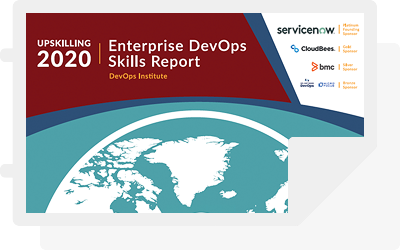The tech industry is constantly evolving as new pieces of technology have their impact on the landscape. Recently, the cloud has made its presence known and has played a large part in altering the way the world thinks about and accesses digital resources. The cloud played a large part in the shift towards enterprises leveraging the software as a service (SaaS) business model of providing live services instead of static products. The rise of SaaS models created a need for organizations to find ways for stepping up their production speeds.
This is the environment in which DevOps practices came in to help organizations meet their goals of continuous integration and continuous delivery (CI/CD). DevOps is both a corporate culture of collaboration and the toolkit used to empower the communication necessary to collaborate on the levels required by today’s competitive software development environment. Customers have come to expect regular and impactful updates to the services for which they pay and the only way to deliver on those expectations is by leveraging every advantage available to your organization.
Testing in a DevOps Environment
The idea of testing is nothing new to software industry experts; however, the process of testing within a DevOps environment is much different from the way testing is handled under more traditional development systems. The key difference between old methods of development such as the waterfall method and DevOps is in the name of DevOps itself. DevOps combines development and operations teams into single, cross-discipline units that all work together simultaneously to develop, test, and deploy bite-sized projects that fit neatly into the live system.
This means testing is no longer something done within its own silo. Under the DevOps system, gone are the days of developers handing off their work to QA while they move onto their next project. Instead, development and testing are done in tandem such that each step of the project development phase involves some form of testing to ensure minimal amounts of backtracking are necessary in the case of errors being discovered.
The environment of collaboration encouraged by DevOps provides each member of the team with deeper insight into every step of the process so they can better understand how their work impacts the work of the team. This creates a system where each member of the team is equipped with the knowledge they need to optimize their impact on the project as a whole. An emphasis on communication allows for everyone to understand the reasoning behind each change and the impact those modifications have. This leads to the development of life cycles that are shorter and more impactful on the overall quality of the product.
Successful deployments are integral for maintaining a high rate of improvements that are stable while also providing meaningful modifications to performance and/or functionality of the live service. A huge part of providing constantly impactful and stable updates to your live services is the utilization of testing practices that provide rapid and consistent results. Leveraging DevOps testing best practices will help to ensure that regular deployments go off without a hitch.
DevOps Testing Best Practices
DevOps seeks to create cross-discipline teams with a focus on collaboration between the members that hail from various backgrounds. Creating a strong team of individuals who function well together is key to embracing the DevOps culture, but there are also some key components that help prop up your newly created teams. Here are some general best practices for implementing impactful testing methodologies into your DevOps structures.
Intelligently Leverage Automation
One of DevOps most important goals is the automation of all rote tasks that don’t require human ingenuity. Any task that is repeated often without the need for meaningful alterations or the application of human understanding to undertake is a perfect candidate for automation. Many aspects of testing can be successfully automated to increase the speed and reliability of testing processes. However, this doesn’t mean every aspect of testing can be successfully automated. The key to employing automation is finding the tasks which are the best fits for automating.
Integrating QA experts into your DevOps teams will empower the teams to decide best which aspects of testing can be automated and which ones are best tackled with the human touch. Automation generally works wonders when it comes to testing for machine errors, but human testing does a much better job of testing for usability and release readiness.
Focus On Rapid Iteration
When working on live systems and utilizing the SaaS structure, CI/CD is the goal and rapid iteration is how you get there. Deploying regular and impactful updates for the customer adds to the perceived value of your service and ensures their continued satisfaction with the subscription fees they pay. Placing a focus on smaller iterations for each DevOps team to tackle one project at a time leads to faster and more stable updates.
Bite-sized chunks of development are much easier to thoroughly test due to the simpler nature of the smaller size of the deployments. Small changes are less likely to result in complicated issues that can lead to setbacks in the software development life cycle (SDLC). This leads to a deeper understanding of each change that’s made and the ability to ensure deployments occur more often and more successfully.
Documentation and Key Metrics
DevOps is all about improving your SDLC speed and optimization through empowering communication and transparency. Documentation is key to providing each team member with the insight they need to iterate upon the existing system. Without proper documentation, teams will struggle to understand the system and the reasons behind each change made. Without strong documentation, the overall state of the project will fall into disarray as team members struggle to comprehend the how and why of the changes.
Furthermore, transparency and thorough metric tracking will empower management to understand how the changes they make to the teams and their processes impact the output of the enterprise’s work. If you don’t track the changes you make and their impact on production, you won’t be able to find what’s working and what isn’t. Keeping tabs on how changes impact the rate and quality of work is imperative for understanding how your DevOps investments are paying off and providing the insight necessary for informing further structural decisions.
DevOps: Solutions for You
If DevOps sounds like a good fit for your organization’s needs but you want to make sure you get it right the first time or you’re struggling with your current DevOps implementation, BMC is the IT solution partner you need. Read more about how automation and DevOps systems can help increase the rate at which you deploy products with BMC’s free eBook: Automate Cloud and DevOps Initiatives. For more information on automation, check out the BMC eBook on Automating the Cloud and DevOps.
BMC expert consultants are available to work with you to bring their knowledge and expertise to your organization. BMC provides custom-tailored Implementation Services for your organization to tackle the unique challenges you face. When partnering with BMC, you get:
- Faster service delivery: Agile releases that keep up with rapid demand
- Visibility across data: Ensure compliance and data accuracy
- Cost-effective service: Increased productivity and performance
- Experienced DevOps professionals: Equip you with the tools you need for success
- Conversion or upgrade: Seamless modernization or total replacement
- All tailored for the specific needs of your organization.
Download or view the Solution Implementation Overview online to learn more about how BMC Consulting Services can help you. Check out The Power of Shifting Left to learn more about amping up your CI/CD pipeline by modernizing your workload orchestration. Then contact the experts at BMC to find out more about how to leverage DevOps and QA best practices for enhanced building, testing, and deployment success.






